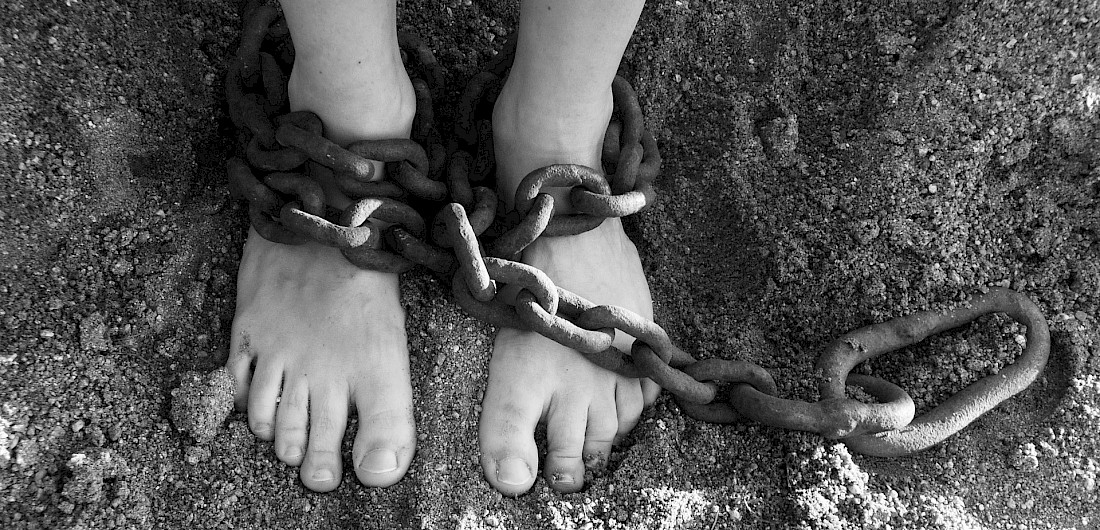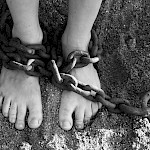The Gospel of Salvation - Part 2: Deliverance from the Power of Sin
When people come to Christ, confess their sins and trust Him that His work on the cross of Calvary was sufficient for them, they are full of joy. They realise that they have ‘peace with God’ (Rom 5:1). Many of them go and tell everyone they know what they have found and how happy they are. And then, suddenly, something goes wrong. They have a bad thought or say a bad word, or worse. What now? They start asking themselves, ‘How could I do this? I had confessed all my sins and accepted Christ as my Saviour. And now I have sinned again.’ And then doubts come: ‘Was my conversion real? Did I repent enough? Why did I sin again?’
The following questions and answers will help you find your way out of this dilemma.
6.1 What is the difference between sin and sins?
The same as the difference between a tree and its fruits. Sins are sinful actions, like the fruits produced by a tree. Sin is the tree itself, the source of the sinful deeds. This is why man’s condition is worse than it seems. It is not enough to solve the problem of sins by taking them away or atoning for them. The source they come from needs to be dealt with too, i.e. sin itself.

6.2 What is the divine solution for sins and for sin?
Sins are forgiven. If you believe on Christ, you are justified from your sins. Sin as such, however, can never be forgiven or pardoned. It can only be condemned. And this is what God did on the cross (Rom 8:3). Acts can be forgiven, but a bad nature must be condemned.

6.3 Is a believer still under the power of sin?
No. A believer can sin (1. Jn 2:1), but he or she does not have to sin, and should not sin. Sin is not an obligation for him or her, nor is it inevitable.
To see how a believer is freed from the power of sin, look at the following questions.

6.4 What are the two races in Romans 5?
Every human being is a son or daughter of Adam from birth but those who accept Christ and believe on Him become members of His race instead. It is our death with Christ that ends our link with Adam so that we become members of this new race of which Christ is the Head.

6.5 What is the consequence of belonging to Adam’s race?
Every child of Adam inherits sin from him, and as a result of sin there is death. This has never changed, which proves sin has reached every child of Adam. This sin produces the bad fruit: sins. Sin and the consequent sins result in death (Rom 5:12).

6.6 And what characterises those who belong to the race headed by Christ?
The grace of God has abounded, and even super-abounded toward many, and its happy and blessed consequence was that justification came (verses 15-19). In other words, every member of the family of Christ is justified.

6.7 So, if I have become part of the race headed by Christ by grace, can I continue to sin?
No - grace is never an excuse for sin (see also next question).

6.8 Why is it inexcusable for a believer to continue in sin (Rom 6:1)?
Because we are dead as far as sin is concerned. Our baptism ‘unto Christ’ is a picture of this because it shows that we are identified with the one who died on the cross because of sin. If he has died, we have died as well as far as ‘our old man’ - what we were as children of Adam - is concerned.

6.9 So, how is it that, at times, I still commit a sin? Am I not dead with Christ?
In Romans 6:6 we learn about the ‘old man’ (see Q 6.10) and that he was crucified with Christ. But we also have to learn, often through painful experience, that we still have the flesh in us (‘flesh’ in this context does not refer to a physical body but our sinful nature). This is why we are still capable of committing sins. For more on this, see questions on Romans 7 (Q 6.17-6.23).

6.10 What is meant by ‘our old man is crucified with him’ (Rom 6:6)?
My ‘old man’ is my person before my conversion, as a child of Adam, a member of Adam’s family (Rom 5:12 ff). Before my conversion, I was responsible before God and guilty. Because of my identification with Christ in His death, God declares that my ‘old man’ is dead as well. He no longer recognises me as I was before my conversion, a guilty person by nature.
Can you feel this? No. But it is still true because God says so. It is not our feelings but God’s thoughts that count. Therefore we should not confuse our old man (which is dead) with the flesh, the sinful nature, which is still in us (Rom 7:17, 18, 25; 8:4; 1. Cor 3:2, 3).

6.11 What is meant by the expression ‘the body of sin’?
We find this expression in Romans 6:6b: ‘that the body of sin might be destroyed, that henceforth we should not serve sin.’ The ‘body of sin’ is the whole mechanism or system of sin in us, the whole principle of sin in humanity.
A believer can still commit a sin (he should not, of course) but sin is no longer the master (or control centre).

6.12 The problem of our sins is solved by the death of Christ for us. But how is the problem of sin and its power solved?
It is not solved by Christ’s death for us, but by our death with Christ. Let’s compare it to the relationship of a slave to his master at the time when Paul was writing. The master has claims over the slave, but only as long as the slave lives. Once the slave dies, his master can do nothing to him. So it is with us. As we have died with Christ, sin has no claim or authority over us. This is deliverance.

6.13 What is the meaning of baptism?
Baptism means identification with Christ in His death. As Christ died and was buried, so we have been baptised (Rom 6:2, 3). Baptism also speaks of other things, for instance that the person baptised becomes a disciple (Jn 4:1, 2 and 1. Cor 10:2) etc. but the point here in Romans 6 is that we are identified with Christ in His death, i.e. have died with him.
Let’s take note that being baptised in itself gives us no right or claim whatsoever to a place in heaven.

6.14 So how do I know that I have died with Christ? Can I feel it?
No. You cannot feel it. If you have accepted Christ in faith, then it simply is a fact and you know it because God’s Word tells you it is so (Rom 6: 8.9).

6.15 If I have died with Christ, how does that affect my relationship with sin?
Sin (the principle of evil, of opposition against God) no longer has any claims over you.
It is like the man who paid another man a large sum to go to war in his place. When the government wrote to him saying, ‘You need to go to war now, your substitute has died,’ he wrote back saying, ‘I’m sorry I cannot go, I’m dead.’ He realised that he had a right to consider himself dead because his substitute had died.

6.16 If I have died with Christ, what does that mean practically in my daily life?
When sin wants to exert a claim over us, we are entitled - and obliged - to consider ourselves dead (see the previous question). By faith we realise that we are under no obligation to give way to sin (Rom 6:10-14). It’s like renting a flat from a landlord. If another landlord buys the flat, you pay rent to the second one, not the first. If the first landlord comes round demanding rent, you tell him to go away because he no longer has rights over the flat or you. Your obligations are to the current owner and landlord. We have a new master (Rom 6:15-23).

6.17 Should a believer keep the law (or certain rules) to make sure he does not sin (Rom 7:1-6)?
No. Law keeping, or even rule keeping, is not the way to go. It is a carnal principle because it relies on the natural ability of man. As soon as you try you will have to admit, if you are honest, that you fail. Paul explains that we are dead to the law just as we are dead to sin. Note as well that God only gave the law of Moses to one nation, Israel, to keep.

6.18 How, then, can a believer live in a way that pleases God?
Not by keeping the law but by being occupied with Christ. This will result in our becoming more like Him and living for Him in our daily lives. If we allow the Holy Spirit to occupy us with Christ, then the Holy Spirit will give us the power to live in a way that pleases God (see Q 6.27 - Q 6.31).

6.19a Who is the ‘I’ in Romans 7:7-25? Is it Paul?
No. It cannot be Paul because he says, ‘For I was alive without the law once…’ (v. 9). This cannot apply to Paul who was brought up as a strict Pharisee (Phil 3:5).

6.19b Who is the ‘I’ in Romans 7:7-25? Is it an unbeliever?
No, it cannot be. The person in Romans 7 already has the new nature; he wants to do what is good (Rom 7:19) and says, ‘For I delight in the law of God after the inward man’ (Rom 7:21). Clearly, these are the desires of the new nature, which God gives at the new birth (Jn 3:3).

6.19c Who is the ‘I’ in Romans 7:7-25? Is it a true believer?
A true believer, yes but not one in a normal state. The statement: ‘I am carnal, sold under sin’ (v. 14), can hardly be the description of the normal state of a believer.

6.19d Who is the ‘I’ in Romans 7:7-25? So who is it then?
It is a person who has been born again (see Q 2.20) but is carnal, not spiritual (1. Cor 3:1), relying on his strength, trying to keep the law, trying to do what is good in his own strength and therefore constantly failing, and extremely unhappy. He does not know that the most ‘spiritual’ or well-meaning flesh is still flesh.
This is not the normal state of a Christian. However, many pass through it at some stage in their lives until they learn to trust not only in Christ but also in His work as sufficient for them, i.e. until they realise practically that they are delivered through the death of Christ.
A believer may enter or return into this state of mind more than once in his or her life.

6.20 What is the person’s problem?
Time and again, the person discovers a great dilemma. It is the battle between his new and his old natures. There are good things he wants to do and he ends up not doing them. Then there are bad things he does not want to do but he falls back, again and again, into doing them (Rom 7:19).

6.21 What does this person discover (Romans 7:17-24)?
At least three things.
First, that he still has the flesh, i.e. the old sinful nature (v. 17).
Then, that nothing good dwells in him personally: ‘For I know that in me, that is, in my flesh, dwelleth no good thing’ (v. 18).
Finally, he discovers that he cannot deliver himself but needs someone else to deliver him: ‘O wretched man that I am! who shall deliver me out of this body of death?’ (v. 24).

6.22 The ‘I’ in Romans 7 has now understood that he cannot pull himself out of the mud. Where does help come from?
Towards the end of chapter 7, this person stops looking for help within himself and starts looking for help from outside. It is not, ‘how shall I deliver myself’, but, ‘who shall deliver me…?’ (Rom 7:24).

6.23 What conclusion is reached in chapter 7?
A two-fold one. First, the person has learned by experience that he cannot do anything good of himself; there is no good in his flesh (Rom 7:18). Then he realises that there are the two natures: the old and irreparably bad one, and the new one. They are opposed to each other. Then, he thanks God (Rom 7:25) because he realises that all that needs to be done has been done already by the Lord Jesus Christ (beginning of verse 25 and of 8:1).
The full conclusion is then reached in 8:1-11 (see Q 6.24 - Q 6.31).

6.24 So can a believer ever be condemned by God (Romans 8:1)?
No, because the believer is now ‘in Christ.’ And, remember, Christ is glorified at God’s right hand, so if anyone wanted to condemn the believer, he would have to condemn Christ - impossible!

6.25 What is meant by the ‘law of the Spirit of life’ and ‘the law of sin and death’ (Romans 8:2)?
The word ‘law’ can also mean principle. A stone falls to the ground. This is a law of nature. The law of the Spirit is also a principle, namely that the Spirit guides us and occupies us with Christ. Similarly, the law of sin is also a principle, namely opposition to God, which leads to death. Once the believer trusts Christ, believes that His work is sufficient and that there is no condemnation for those in Christ Jesus (i.e. once he believes ‘the gospel of his salvation’ (Eph 1:13)), the Spirit of God is free to operate in him.

6.26 What is God’s solution for sin (Romans 8:3)?
God forgives sins, i.e. the deeds, but sin can only be condemned. There is no other way consistent with the nature of God but to condemn sin. The law could not achieve anything against sin because it was ‘weak through the flesh’, i.e. man was not able to keep it.

6.27 Does this mean that believers keep doing things which were forbidden under the law? Why not? (Romans 8:4)
No. The righteous claims of the law are fulfilled in the believer. But the reason is not that he tries to keep the law but that he walks by the Spirit, which implies that he walks according to God’s mind and will, and therefore abhors evil.

6.28 How does ‘walking in the Spirit’ work practically?
The Spirit occupies the believer with Christ (Jn 14:26; 16:13, 14). This fills the believer with joy and also a desire to become like Christ. As we imitate Christ, the claims of the law are fulfilled automatically as a byproduct.
Let’s take an example. The law says, ‘thou shalt not steal.’ A believer is not under the law, but the Spirit occupies him or her with Christ. He was rich but became poor. He said that giving is more blessed than receiving. As the believer learns to love Christ and imitates Him, he wants to benefit others. In view of this, how can he possibly steal (Eph 4:28)?
It is so obvious that this is the kind of behaviour that is appropriate for someone who loves the Lord that it is not optional but obligatory - an obligation to act in a way that is fitting, given that we love Him. This is why the Apostle John points out that loving God and His children implies keeping His commandments (1. Jn 2:3; 3:22-24; 5:2, 3). When we love someone then a simple desire of that person becomes a commandment for those who love him.

6.29 But does a believer always walk in the Spirit?
It would be normal if he did, but, sadly, this is not always the case as we know from experience. A believer is generally led by the Spirit, but it is possible for him to grieve the Spirit (Eph 4:30). This happens every time a believer sins, because he is not occupied with Christ or does not live under His eye, in communion with Him.

6.30 How can we make sure we walk in the Spirit?
Simply by putting away everything from our lives that grieves the Spirit. If you harbour bad thoughts, you need to confess this before the Lord. If you say a bad word, the same applies. Don’t wait - keep short accounts with God. If we do this, the Spirit is free again to occupy us with Christ and to ‘lead us’ (Rom 8:14). Then we will ‘mortify the deeds of our body’ (Rom 8:13) and walk in the Spirit.

6.31 What does God do to help us walk in the Spirit?
God has sent us His Spirit to dwell in us (Romans 8:10, 11), which He now does in every believer (see also 1. Cor 6:19), occupying us with Christ (Jn 16:14), and giving us the consciousness that God is our Father (Rom 8:15, 16). This is complete salvation: justified from sins, delivered from the power of sin, and knowing God as a loving Father through the Holy Spirit!

6.32 If our salvation is so complete, why do many believers still suffer in their bodies and die? Is the body not included in our salvation?
Believers still suffer because they are still part of creation. Paul explains this in the next paragraph (Rom 8:18-29). Through man, sin came into the world and, as a result, ‘the whole creation groans.’ But this problem will be solved as well. We wait for the ‘redemption of our body’ (v. 23). When Christ comes, we will receive new bodies. Meanwhile, we have this ‘hope’ and the Spirit who helps us in our infirmities (v. 26). Compare Q. 2.11.

6.33 Has God predestinated anyone to condemnation?
No, the Bible never says so. God wants all men to be saved (Tit 2:11; 1. Tim 2:4; 2. Pet 3:9). Also, God ‘now commandeth all men everywhere to repent’ (Acts 17:30). In Romans 9:18 it says that God hardens whom He will, but only after man has hardened himself, as the example of Pharaoh shows (v.14-17). Romans 9:22-23 states very carefully that God prepared the vessels of mercy unto glory, but not that God prepared the vessels of wrath for condemnation. Unrepentant sinners do that for themselves.
THE WONDERFUL GOSPEL OF SALVATION IS OPEN TO EVERYONE!

SUMMARY
There are three great problems that plague mankind:
sins (= sinful actions)
sin (= the principle of evil, the source of evil actions), and
physical sufferings.
- The first problem is solved by the death of Christ for us (Rom 3-5:11).
- The second problem is solved by our death with Christ (Rom 5:12- Rom 6).
- The third problem is solved when Christ returns (Rom 8).
But in each case, we owe everything to Christ!






































